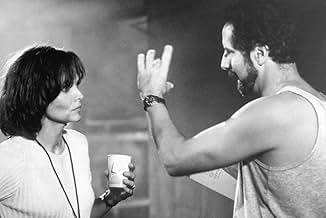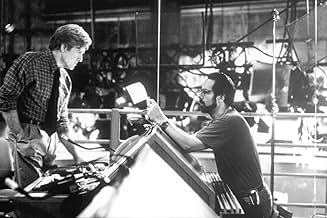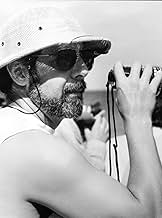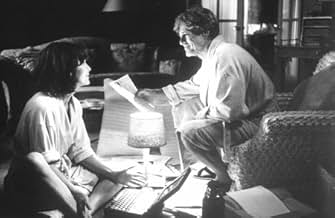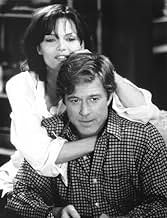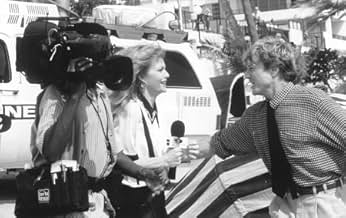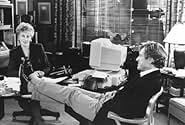ÉVALUATION IMDb
6,1/10
16 k
MA NOTE
Ajouter une intrigue dans votre langueAn ambitious young woman, determined to build a career in television journalism, gets good advice from her first boss, and they fall in love.An ambitious young woman, determined to build a career in television journalism, gets good advice from her first boss, and they fall in love.An ambitious young woman, determined to build a career in television journalism, gets good advice from her first boss, and they fall in love.
- Nommé pour 1 oscar
- 3 victoires et 3 nominations au total
Lily Gibson
- Star Atwater
- (as Lily Nicksay)
Histoire
Le saviez-vous
- AnecdotesThe line Bucky Terranova (Joe Mantegna) used when he first meets Tally Atwater (Michelle Pfeiffer) - "Your voice is full of money" - was from F. Scott Fitzgerald's novel, "The Great Gatsby". In Gatsby le magnifique (1974), Robert Redford played the title role.
- GaffesTally is supposedly in the prison with one camera, yet shots beamed live from her include shots of her camera crew holding a camera. In addition we see cutting of shots between Tally and Fernando as if there were two cameras there.
- Citations
Tally Atwater: Do you want to be with me?
Warren Justice: So much it hurts.
Commentaire en vedette
Ethics, love, dedication and overcoming, these are some of the basic ingredients to achieve success in all fields, both personally and professionally. This may be the alchemy that made "Up Close and Personal", a sweet, true film capable of touching audiences around the world. Jon Avnet, expert in the art of emotion, without using cliché, or even resorting to fetched subterfuge, managed once again to tell a story with the delicacy and subtlety that the human soul needs.
Sally Atwater (Michelle Pfeiffer) plays a girl who dreamed of becoming a journalist. Even without professional training, she creates a video to ask for a job in several stations. Sally, totally confused, arrives at TV Miami and finds the head of journalism, Warren Justice (Robert Redford), a veteran journalist, passionate about the profession and who doesn't sell his ethical principles for fame or money. Because of this he has his career boycotted. Position to some extent questioned by colleagues in the profession, being, among other things, considered a difficult person to deal with.
Justice, a name that enhances the personality of the editor-in-chief, even knowing that Sally Atwater has no experience in the area, manages to see her potential and accepts her as an intern, becoming his mentor. One day, after making Sally serve too many coffees, he lets her be the weather girl, then, by fate, she has the opportunity to be live in a story. Over time, she gradually becomes established professionally and the relationship between him and his mentor becomes a great passion.
A kind of "A Star is Born" within journalism, "Intimate & Personal" is a production that does not reach all its potential. Not even remotely close to the brilliance of his "Fried Green Tomatoes", Jon Avnet delivers a work that is just right, albeit often with excessive narrative simplicity. Robert Redford doesn't have much to do in the shoes of Warren Justice, a character without great complexity, and even Michelle Pfeiffer, despite her charisma and talent, can't go beyond the limits of a protagonist portrayed with insecurity by the script: in the first half from the film, Tally is a romantic comedy character, with even some humorous scenes (which don't always work); and in the final stretch, she assumes the air of a tragic heroine, with tearful moments underlined by the beautiful "Because you loved me", in the voice of Celine Dion. This almost schizophrenia of the film is what makes it difficult for the audience to fully engage in its story - it can even move the most sensitive, but, compared to what it could have been (especially with all the dramas lived by Savitch, its original inspiration), it's just a derivative and predictable drama.
Still, the romantic drama is a well-crafted mix of technical, textual, visual, and sound aspects. From the selection of actors - Michelle Pfeifer and Robert Redford identified with the characters forming an accomplice and captivating pair - to the choice of songs - the film won the Oscar for best song with the aforementioned "Because You Loved Me"-, in everything we try to convey the message of renewal to the public in a simple, beautiful and sensitive way.
The film uses many metaphors, even by genre, working on the meaning of words to insinuate the context. Some examples are when Warren refers to Tally as commenting that "she devours the lens", foreshadowing her competence and success, or when he tells her that she is "not good company in the morning" to warn that he was not good with relationships. But the film's deepest metaphor is the one that refers to the true value of a journalist, "what we in the news cannot forget is that we are worth the stories we tell".
Warren and Tally's characters were built on a stereotype of the television journalist as someone very concerned with the image and little with the message, with the purpose of transmitting to millions of viewers a fact that, although it may not interest them, positively or negatively influences your life. Warren is an upstanding, honorable, idealistic, committed and serious journalist who, for that very reason, is considered difficult, intractable and has a "thorny" career. (One particularity: this role played by Robert Redford, is very similar to his personality. The actor, like the character, is considered in his environment a difficult person, who only does things his way).
Tally, on the other hand, is a sensitive and hardworking woman, with a strong yet captivating personality. Her identity construction takes place throughout the film, allowing the audience to reflect on how an inexperienced reporter, if well guided, can become an excellent journalist. Tally, always worried about appearing early, finds herself suddenly being rejected by the public, devastated by the rival anchor who exposes her to ridicule in certain situations, shaking her self-esteem and shaking her career, until Warren helps her see: "Give it to me." them Tally Atwater, he says. Where is Tally Atwater? To earn the trust of millions of viewers, you need to hear what they say." And Tally finally understands what it means to be a reporter and surprises herself by doing a great story alone and conquering the highest position of a journalistic career.
An aspect of great formal beauty in the work is the scene in which Tally decides to improvise, instead of following what was written on the teleprompter, at the moment of her thanks. And speaking with the voice of her heart, freeing herself from patterns and definitely taking possession of herself, she thanks those who really deserve applause. "I'm just here to tell a story," she concludes. In "Up Close and Personal", the idea behind the romance of the characters Tally Atwater and Warren Justice, seems to be to demonstrate to the general public the human frailty. Using the love plot, the author seems to denounce, in the exposition of the characters' daily lives, the great struggle of all of us against our own weaknesses and ills. He then seeks to demonstrate the need for hope, determination, and character.
But in the end, there has to be some conflict. Something has to be problematized for the film to sustain itself. And director Jon Avnet knows his craft. He introduces the viewer to the intimacy of TV without offending anyone, but does not let naivety organize the narrative. Build a group of very nice but not silly characters. In addition, Avnet is lenient with the institution he analyzes, TV, but he does not fail to point out some thorns. And, above all, he values his actors, making an efficient vehicle (for protagonists and supporting actors).
"Telling the story of the couple of journalists", the author proposes a deeper reflection of journalistic ethics. And most interesting of all... Through the film, he says exactly what his characters experienced: that he (the author) is there, making this film, to "tell a story"... And, who knows, offer the public a new nuance of facts for reflection... In the film, the great debate is the eternal doubt between getting an audience at any cost and discovering the truth of facts and being. It is wrong to think that it is an exclusive story for communication professionals. It is a love story framed by ethics, dedication and overcoming that enchants and makes everyone reflect.
Sally Atwater (Michelle Pfeiffer) plays a girl who dreamed of becoming a journalist. Even without professional training, she creates a video to ask for a job in several stations. Sally, totally confused, arrives at TV Miami and finds the head of journalism, Warren Justice (Robert Redford), a veteran journalist, passionate about the profession and who doesn't sell his ethical principles for fame or money. Because of this he has his career boycotted. Position to some extent questioned by colleagues in the profession, being, among other things, considered a difficult person to deal with.
Justice, a name that enhances the personality of the editor-in-chief, even knowing that Sally Atwater has no experience in the area, manages to see her potential and accepts her as an intern, becoming his mentor. One day, after making Sally serve too many coffees, he lets her be the weather girl, then, by fate, she has the opportunity to be live in a story. Over time, she gradually becomes established professionally and the relationship between him and his mentor becomes a great passion.
A kind of "A Star is Born" within journalism, "Intimate & Personal" is a production that does not reach all its potential. Not even remotely close to the brilliance of his "Fried Green Tomatoes", Jon Avnet delivers a work that is just right, albeit often with excessive narrative simplicity. Robert Redford doesn't have much to do in the shoes of Warren Justice, a character without great complexity, and even Michelle Pfeiffer, despite her charisma and talent, can't go beyond the limits of a protagonist portrayed with insecurity by the script: in the first half from the film, Tally is a romantic comedy character, with even some humorous scenes (which don't always work); and in the final stretch, she assumes the air of a tragic heroine, with tearful moments underlined by the beautiful "Because you loved me", in the voice of Celine Dion. This almost schizophrenia of the film is what makes it difficult for the audience to fully engage in its story - it can even move the most sensitive, but, compared to what it could have been (especially with all the dramas lived by Savitch, its original inspiration), it's just a derivative and predictable drama.
Still, the romantic drama is a well-crafted mix of technical, textual, visual, and sound aspects. From the selection of actors - Michelle Pfeifer and Robert Redford identified with the characters forming an accomplice and captivating pair - to the choice of songs - the film won the Oscar for best song with the aforementioned "Because You Loved Me"-, in everything we try to convey the message of renewal to the public in a simple, beautiful and sensitive way.
The film uses many metaphors, even by genre, working on the meaning of words to insinuate the context. Some examples are when Warren refers to Tally as commenting that "she devours the lens", foreshadowing her competence and success, or when he tells her that she is "not good company in the morning" to warn that he was not good with relationships. But the film's deepest metaphor is the one that refers to the true value of a journalist, "what we in the news cannot forget is that we are worth the stories we tell".
Warren and Tally's characters were built on a stereotype of the television journalist as someone very concerned with the image and little with the message, with the purpose of transmitting to millions of viewers a fact that, although it may not interest them, positively or negatively influences your life. Warren is an upstanding, honorable, idealistic, committed and serious journalist who, for that very reason, is considered difficult, intractable and has a "thorny" career. (One particularity: this role played by Robert Redford, is very similar to his personality. The actor, like the character, is considered in his environment a difficult person, who only does things his way).
Tally, on the other hand, is a sensitive and hardworking woman, with a strong yet captivating personality. Her identity construction takes place throughout the film, allowing the audience to reflect on how an inexperienced reporter, if well guided, can become an excellent journalist. Tally, always worried about appearing early, finds herself suddenly being rejected by the public, devastated by the rival anchor who exposes her to ridicule in certain situations, shaking her self-esteem and shaking her career, until Warren helps her see: "Give it to me." them Tally Atwater, he says. Where is Tally Atwater? To earn the trust of millions of viewers, you need to hear what they say." And Tally finally understands what it means to be a reporter and surprises herself by doing a great story alone and conquering the highest position of a journalistic career.
An aspect of great formal beauty in the work is the scene in which Tally decides to improvise, instead of following what was written on the teleprompter, at the moment of her thanks. And speaking with the voice of her heart, freeing herself from patterns and definitely taking possession of herself, she thanks those who really deserve applause. "I'm just here to tell a story," she concludes. In "Up Close and Personal", the idea behind the romance of the characters Tally Atwater and Warren Justice, seems to be to demonstrate to the general public the human frailty. Using the love plot, the author seems to denounce, in the exposition of the characters' daily lives, the great struggle of all of us against our own weaknesses and ills. He then seeks to demonstrate the need for hope, determination, and character.
But in the end, there has to be some conflict. Something has to be problematized for the film to sustain itself. And director Jon Avnet knows his craft. He introduces the viewer to the intimacy of TV without offending anyone, but does not let naivety organize the narrative. Build a group of very nice but not silly characters. In addition, Avnet is lenient with the institution he analyzes, TV, but he does not fail to point out some thorns. And, above all, he values his actors, making an efficient vehicle (for protagonists and supporting actors).
"Telling the story of the couple of journalists", the author proposes a deeper reflection of journalistic ethics. And most interesting of all... Through the film, he says exactly what his characters experienced: that he (the author) is there, making this film, to "tell a story"... And, who knows, offer the public a new nuance of facts for reflection... In the film, the great debate is the eternal doubt between getting an audience at any cost and discovering the truth of facts and being. It is wrong to think that it is an exclusive story for communication professionals. It is a love story framed by ethics, dedication and overcoming that enchants and makes everyone reflect.
- fernandoschiavi
- 17 nov. 2022
- Lien permanent
Meilleurs choix
Connectez-vous pour évaluer et surveiller les recommandations personnalisées
- How long is Up Close & Personal?Propulsé par Alexa
Détails
- Date de sortie
- Pays d’origine
- Langues
- Aussi connu sous le nom de
- Up Close & Personal
- Lieux de tournage
- sociétés de production
- Consultez plus de crédits d'entreprise sur IMDbPro
Box-office
- Budget
- 60 000 000 $ US (estimation)
- Brut – États-Unis et Canada
- 51 088 705 $ US
- Fin de semaine d'ouverture – États-Unis et Canada
- 11 101 955 $ US
- 3 mars 1996
- Brut – à l'échelle mondiale
- 100 688 705 $ US
- Durée2 heures 4 minutes
- Couleur
- Mixage
- Rapport de forme
- 1.85 : 1
Contribuer à cette page
Suggérer une modification ou ajouter du contenu manquant

Lacune principale
By what name was Intime et personnel (1996) officially released in India in English?
Répondre

